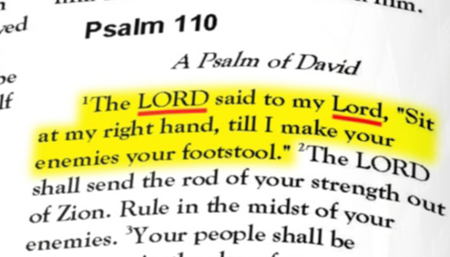 In my opening statement in my recent debate with Sheikh Inamullah Mumtaz, I briefly mentioned in passing Psalm 110, in which Yahweh says to one identified (in verse 1) as Adoni (the possessive form of Adon, which is translated "lord"), "Sit at My Right Hand, until I make your enemies a footstool for your feet." Here is the full Psalm:
In my opening statement in my recent debate with Sheikh Inamullah Mumtaz, I briefly mentioned in passing Psalm 110, in which Yahweh says to one identified (in verse 1) as Adoni (the possessive form of Adon, which is translated "lord"), "Sit at My Right Hand, until I make your enemies a footstool for your feet." Here is the full Psalm:"The Lord says to my Lord: “Sit at my right hand, until I make your enemies your footstool.” The Lord sends forth from Zion your mighty scepter. Rule in the midst of your enemies! Your people will offer themselves freely on the day of your power, in holy garments; from the womb of the morning, the dew of your youth will be yours. The Lord has sworn and will not change his mind, “You are a priest forever after the order of Melchizedek.” The Lord is at your right hand; he will shatter kings on the day of his wrath. He will execute judgment among the nations, filling them with corpses; he will shatter chiefs over the wide earth. He will drink from the brook by the way; therefore he will lift up his head."In order to save time, I simplified by argument somewhat, and said that the one to whom Yahweh is speaking in verse 1 is identified as Adonai. I was not at all wrong in saying this, and I was prepared to clarify my exegesis should I have been challenged on it. As an informed Unitarian, Muslim, or orthodox Jew will tell you, technically verse 1 of Psalm 110 says "Yahweh says to Adoni..." Adoni is not exclusively a divine title, whereas Adonai is. The two words are almost identical in the Hebrew. The only distinguishing feature is the difference in Masoretic "vowel pointing" associated with the two words -- something which developed centuries after Christ.
Sometimes it is claimed that Adoni never refers to God, but this is incorrect. For example, the word Adoni is used for the Angel of Yahweh in Judges 6:13, and the Angel of Yahweh is clearly identified as none other than God Himself (see my article here for a defence of this).
So what are my grounds for interpreting verse 1 as referring to Adonai, even though the Hebrew text says Adoni? The key is verses 5-7:
"The Lord is at your right hand; he will shatter kings on the day of his wrath. He will execute judgement among the nations, filling them with corpses; he will shatter chiefs over the wide earth. He will drink from the brook by the way; therefore he will lift up his head."Verse 5 does indeed say "Adonai", and it clearly interprets verse 1, since Adonai is said to be seated at Yahweh's right hand. Verses 5-7, moreover, can hardly be applied to anyone but God.
Finally, David should never be inferior to any of his descendants. Therefore, for him to call any of them 'Lord' raises the question as to what sort of 'Lord' that could possibly be.

5 comments:
Doing really well Brother Jonathan Good points Praise GOD Big Love
NoDhimmi: Care to show how this is "patent nonsense"? Boring to you maybe, not to others.
Yahweh at Adoni's righ hand in verses 5-7 is not a reference to the heavenly seating, but rather a statement about God's positioning of himself in powerful protective support of Adoni the one he called "my lord" in verse one. A parallel can be seen in the World English Bible at Psalm 121::5: "Yahweh is your keeper. Yahweh is your shade on your right hand." God protects his followers generally, and in that sense he can be said to be at our right hand, but that does not mean that we are in an authoritative position and he has been SEATED at our right hand as Adoni was seated in Psalm 110:1. Adoni is the messiah all right, but he is not Almighty God.
--Danny Andre' Dixon
I wanted to note that I am not a Muslim, I am a Christian. I regularly attend the First Christian Church of Fort Stockton, TX, where I am a public high school English teacher. I had never posted here before, so I just wanted to identify myself for your future reference.
Your post is clearly wrong.
https://youtu.be/z1XzTvNPYHM
Post a Comment